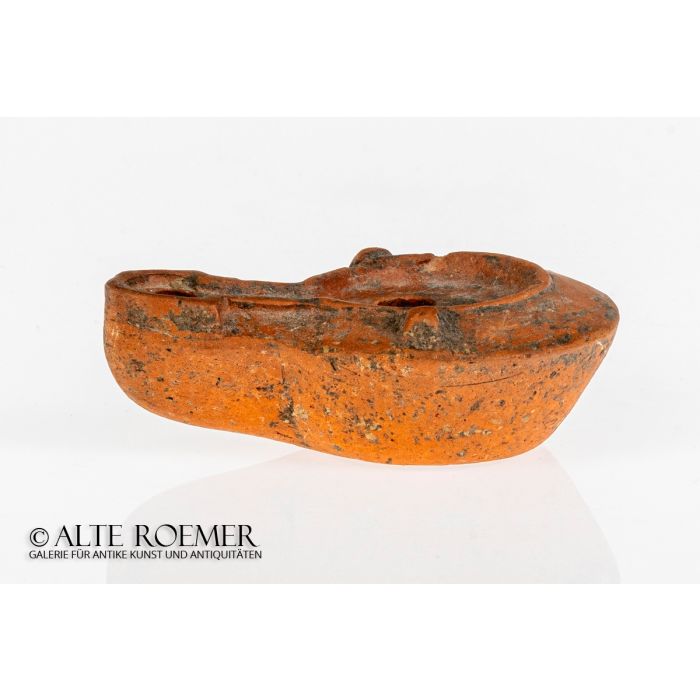Roman oil lamp found in Regensburg area
Price: on request
Sold
Object number
AR2811B
| Object: |
Oil lamp with makers mark Q G C So-called Firmenlampe or Firmalampe |
| Material: |
Red clay
|
| Period: |
This lamp belongs to the type Loeschke X which was produced from the early 2nd until the beginning of the 3rd century A.D. Roman Empire |
| Description: |
Round body, discus without decorations. Two small knobs on the shoulder. A high ring surrounds the discus and the elongated nozzle, creating a channel. Bottom with concentric ring, therein makers mark QGC.
|
| Dimensions: |
Length 88 mm, width 62 mm, height 33 mm
|
| Condition: |
Perfectly preserved, minimal wear.
|
| References: |
Alram-Stern, Die römischen Lampen aus Carnuntum (1989) p. 202, pl. 11 and pl. 30 Nr. 275ff A. Leibundgut, Die römischen Lampen in der Schweiz (Bern 1977) p. 327 s.v. QGC; p. 287 Nr. 885; p. 289 and pl. 13 Nr. 909; |
| Provenance: |
Acquired by us in 2019 from the German Rehorik family collection. The collection was built in the 1960ies and 1970ies by Hugo Rehorik. It consists entirely of archeological finds from the region around Regensburg in Germany. Hugo Rehorik (1905-1979) was working in the Regensburg area as an voluntary archeologist, mostly together with Hans-Jürgen Werner (1941-1997) and with the help of Gerhard and Robert Pleyer. The team supported the Landesamt für Denkmalschutz (state department of cultural heritage preservation) with the recovery of artefacts. This support was of great importance because the 1960ies saw the advent of deep plowing in Germany. Artefacts in the ground needed to be saved from destruction by the new agricultural machines quickly. The state archeologists praised this cooperation highly. It is a nice example of volunteers and professionals working together to preserve our cultural heritage. And also a role model urgently needed for today's situation in archeology. The finds were documented and examined according to scientific standards. Intricate restorations were performed by Heinz Rademacher (1929-1992) who worked for the städtische Museum Regensburg (city museum of Regensburg). Most pieces were then given to museums, namely the Historische Museum in Regensburg (Regensburg historical museum), the Naturkundemuseum Regensburg (Regensburg natural history museum) and the archäologische Staatssammlung in München (archeological state collection of Munich). Individual pieces have been split among the volunteers with the consent of the state archeologists. This way the Rehorik collection came into existence. |
| Literature on the Rehorik collection: |
S. Kuchlmayr, Vom Tertiär zur Römerzeit: Hugo Rehorik u. seine Funde, in Regensburger illustriertes Stadtmagazin no. 3 / 5 (1979), pages 14f. A. Stroh, Bericht der vorgeschichtlichen Abteilung des Museums Regensburg (1965), mentions Hugo Rehorik's relation to numerous finds and research results; Stroh is praising Rehorik's contributions as an amateur archaeologist. F. D. Davis, Neue bandkeramische Gräber von Mangolding (1968), the book deals among other topics with an excavation in which Hugo Rehorik took part in. H. T. Fischer, Archäologische Ausgrabungen und Funde in der Oberpfalz (1982) mentions Hugo Rehorik and explains how thankful the local archaeologist are for their volunteers. T. Fischer, Im memoriam Hans-Jürgen Werner, in Acta Albertina Ratisbonesia 50/2, pages 231ff (1997), the memorandum includes a very good summary of the cooperation with Hugo Rehorik and the situation and working methods in the 1960ies and 1970ies. |
| Authenticity: |
We unconditionally guarantee the authenticity of every artefact, all items are subject to our lifetime return policy on authenticity.
|


